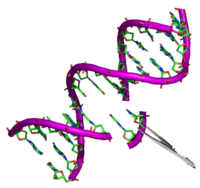
Engineered Spider Silk Proteins for Biomimetic Spinning of Fibers with Toughness Equal to Dragline Silks
Sign Up to like & getrecommendations! Published in 2022 at "Advanced Functional Materials"
DOI: 10.1002/adfm.202200986
Abstract: Spider silk is the toughest fiber found in nature, and bulk production of artificial spider silk that matches its mechanical properties remains elusive. Development of miniature spider silk proteins (mini‐spidroins) has made large‐scale fiber production… read more here.
Keywords: silk; toughness equal; dragline silks; biomimetic spinning ... See more keywords

Experimental Methods for Characterizing the Secondary Structure and Thermal Properties of Silk Proteins.
Sign Up to like & getrecommendations! Published in 2019 at "Macromolecular rapid communications"
DOI: 10.1002/marc.201800390
Abstract: Silk proteins are biopolymers produced by spinning organisms that have been studied extensively for applications in materials engineering, regenerative medicine, and devices due to their high tensile strength and extensibility. This remarkable combination of mechanical… read more here.
Keywords: methods characterizing; experimental methods; secondary structure; silk proteins ... See more keywords

Large Scale production of Synthetic Spider Silk Proteins in Escherichia Coli.
Sign Up to like & getrecommendations! Published in 2021 at "Protein expression and purification"
DOI: 10.1016/j.pep.2021.105839
Abstract: Spider silk, which has remarkable mechanical properties, is a natural protein fiber produced by spiders. Spiders cannot be farmed because of their cannibalistic and territorial nature. Hence, large amounts of spider silk cannot be produced… read more here.
Keywords: large scale; silk; synthetic spider; silk proteins ... See more keywords

C-Terminal Domains of Spider Silk Proteins Having Divergent Structures but Conserved Functional Roles.
Sign Up to like & getrecommendations! Published in 2022 at "Biomacromolecules"
DOI: 10.1021/acs.biomac.1c01513
Abstract: Spider silk is self-assembled from silk proteins or spidroins. C-terminal domains (CTDs) of various types of spidroins are relatively conserved in amino acid sequences and are suggested to adopt similar structures and perform similar functional… read more here.
Keywords: terminal domains; spider silk; silk proteins; silk ... See more keywords

3D electron-beam writing at sub-15 nm resolution using spider silk as a resist
Sign Up to like & getrecommendations! Published in 2021 at "Nature Communications"
DOI: 10.1038/s41467-021-25470-1
Abstract: Electron beam lithography (EBL) is renowned to provide fabrication resolution in the deep nanometer scale. One major limitation of current EBL techniques is their incapability of arbitrary 3d nanofabrication. Resolution, structure integrity and functionalization are… read more here.
Keywords: resolution; electron beam; silk proteins; spider silk ... See more keywords

Method for the Destruction of Endotoxin in Synthetic Spider Silk Proteins
Sign Up to like & getrecommendations! Published in 2018 at "Scientific Reports"
DOI: 10.1038/s41598-018-29719-6
Abstract: Although synthetic spider silk has impressive potential as a biomaterial, endotoxin contamination of the spider silk proteins is a concern, regardless of the production method. The purpose of this research was to establish a standardized… read more here.
Keywords: endotoxin; silk; synthetic spider; silk proteins ... See more keywords

Recombinant Spider Silk: Promises and Bottlenecks
Sign Up to like & getrecommendations! Published in 2022 at "Frontiers in Bioengineering and Biotechnology"
DOI: 10.3389/fbioe.2022.835637
Abstract: Spider silk threads have exceptional mechanical properties such as toughness, elasticity and low density, which reach maximum values compared to other fibre materials. They are superior even compared to Kevlar and steel. These extraordinary properties… read more here.
Keywords: silk; production; silk proteins; silk promises ... See more keywords

Aquatic silk proteins in Chironomus: A review
Sign Up to like & getrecommendations! Published in 2018 at "Journal of Limnology"
DOI: 10.4081/jlimnol.2018.1797
Abstract: Silk proteins secreted by salivary glands in the dipteran insect, Chironomus play a significant role as proteinaceous adhesives for construction of underwater housing nests by larvae. To date, only three Chironomus species, C. tentans Fabricius,… read more here.
Keywords: chironomus review; proteins chironomus; aquatic silk; silk ... See more keywords